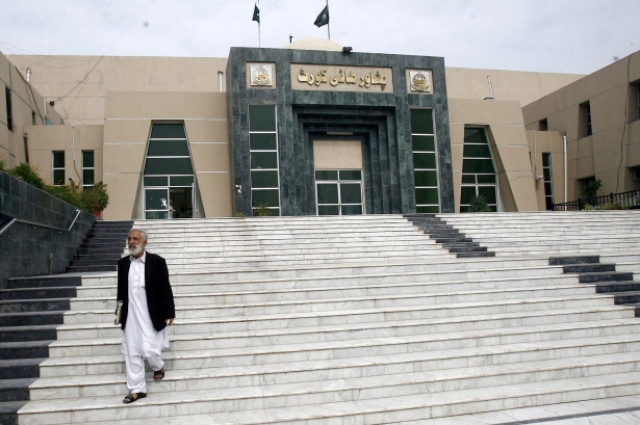Covering tribal areas: K-P law officer opposes federal govt’s stance
Endorses PHC decree to extend the jurisdiction of superior courts to Fata.

On April 7, 2014, the Peshawar High Court (PHC) recommended that parliament amend Article 247 (7) of the Constitution to extend the superior courts’ jurisdiction. PHOTO: PPI
On April 7, 2014, the Peshawar High Court (PHC) recommended that parliament amend Article 247 (7) of the Constitution to extend the superior courts’ jurisdiction.
Appearing before the apex court’s three-judge bench hearing the federal government appeal against the PHC order, K-P’s Additional Advocate General (AAG ) Waqar Ahmad Khan said the matter should be put before parliament so that jurisdiction of the Supreme Court and high court can be extended to Fata.
He also requested the bench, headed by Chief Justice Nasirul Mulk, to dismiss the federal government’s plea, arguing that it was time barred.
A PHC bench, headed by its former chief justice Mian Fasihul Mulk, had recommended that parliament amend Article 247 (7) of the Constitution to extend the jurisdiction of the Supreme Court and the high court to Fata.
The Article 247(7) reads: “Neither the Supreme Court nor a high court shall exercise any jurisdiction under the Constitution in relation to a tribal area, unless Majlis-e-Shoora (Parliament) by law otherwise provides.”
The high court had observed that the denial of fundamental rights, which were available to other citizens, had made tribal areas the most dangerous region.
The tribal areas are governed by the colonial-era Frontier Crimes Regulation (FCR), which denies many fundamental rights to tribesmen.
The federal government had, however, challenged the PHC judgment in the Supreme Court on the pretext that the high court cannot issue specific directives to parliament for making constitutional amendments.
“The impugned judgment is against the principle of the trichotomy of powers between the judiciary, parliament and executive,” the appeal said.
The government also objected that it had been left unheard by the high court. “The impugned judgment [of the PHC] is, therefore, liable to be set aside,” it said.
On January 5, the K-P Assembly also passed a unanimous resolution demanding that the federal government extend jurisdiction of the superior judiciary to Fata in order to fulfill basic requirements of justice in the area.
Meanwhile, in a case related to the applicability of Code of Criminal Procedure (CrPc) in Fata, Deputy Attorney General Sajid Ilyas Bhatti in a statement said applicability of the CrPc has also been extended to Fata to some extent but some of the FCR’s provisions have an overriding effect as it is a special law.
The bench sought assistance from the AGP in this matter and adjourned the hearing for an indefinite period.
Published in The Express Tribune, February 14th, 2015.













COMMENTS
Comments are moderated and generally will be posted if they are on-topic and not abusive.
For more information, please see our Comments FAQ